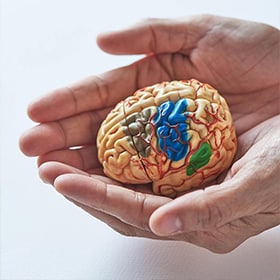HEARING LOSS
We educate our patients on the causes and effects of hearing loss.
HOW DO WE HEAR?
Hearing loss is one of the most common conditions afflicting adults in the U.S. To understand hearing loss, first it’s important to understand how we hear.
- Sound waves in the air go into the outer ear and travel through the ear canal, which is the route that leads to the eardrum.
- The eardrum vibrates from the incoming sound waves and sends these vibrations to tiny bones in the middle ear. These bones convert the sound vibrations from the air into ripples on the body of liquid which sits in the cochlea of the inner ear.
- The ripple is felt by hair cells, and the hair cells move up and down in response.
- Chemicals which react to this movement create electrical signals, which are then carried to the brain through the auditory nerve.
- In the brain these electrical signals are turned into a sound that we recognize and understand.
TYPES OF HEARING LOSS
Hearing loss can be temporary or permanent. There are three main types of hearing loss: sensorineural, conductive, and mixed.
Sensorineural hearing loss is caused by damage to the hair cells inside the inner ear or the auditory nerve. This distorts the electrical signals being sent to your brain, which makes it tough for your brain to process the sound. The quality of sound you hear is reduced and your ability to hear quiet sounds is diminished. Although sensorineural hearing loss is permanent it can be managed with hearing aids.
Conductive hearing loss occurs when sounds are obstructed and unable to pass from your outer ear to your inner ear, usually because of a blockage such as earwax. Due to this obstruction sounds become quieter and muffled. Conductive hearing loss is usually temporary and can be cleared up by a medical professional.
Mixed hearing loss is a combination of sensorineural and conductive hearing loss. The sensorineural portion may be due to age and the conductive portion could be caused by impacted earwax. To treat this type of hearing loss you would see a medical professional to clear up the conductive portion and wear hearing aids to manage the sensorineural portion.
SIGNS OF HEARING LOSS
It’s not always easy to tell if you’re losing your hearing, especially since hearing loss often occurs gradually. For many people with hearing loss, high pitched sounds are the hardest to hear. High pitch sound examples include birds chirping and women and children’s voices. Some other common signs of hearing loss in adults include:
- Straining to hear what other people are saying
- Turning the TV volume up louder than normal
- Misunderstanding other people, especially in noisy places
- Regularly asking people to repeat themselves
- Hearing sounds but struggling to understand what is being said
SIGNS OF HEARING LOSS IN CHILDREN
Signs of hearing loss can appear different in children. If you are concerned that your child has hearing loss, look out for the following signs:
- Having limited, poor, or no speech at an age where speech is appropriate
- A need for higher volume when watching TV
- Answering inappropriately to your words
- Failing to respond to their name or being easily frustrated when there’s a lot of background noise
If you feel that your child might have hearing loss, the best thing to do is schedule a hearing test. We offer comprehensive hearing exams for adults and children which will show the exact nature and extent of any hearing loss present.
HEARING LOSS AND DIMENTIA
Hearing is an important part of your overall health and well-being. When you can’t hear properly because of hearing loss, your brain doesn’t receive the proper stimulation it needs to stay active and healthy. Many don’t realize that we don’t hear with our ears, but with our brains. Hearing loss prevents the brain from receiving certain sound signals which are crucial for retaining information and forming memories. If left untreated, hearing loss can lead to cognitive decline and even dementia.
When you have hearing loss, you may feel embarrassed because you have to ask others to repeat themselves, or you can’t confidently follow along with the conversation. You may isolate yourself from other people and avoid social gatherings as a result. Your brain needs social interaction in order to remain active and healthy. Studies show, when you don’t use your brain to converse with other people you increase your chances of developing dementia.
Don’t let hearing loss keep you from the people you love. With hearing aids, you can hear the conversation and feel confident in social groups. Combat dementia and feelings of loneliness by talking to our team at Best Life Hearing Center.

Address:
850 N Main St EXTENSION,
Bldg 1, Ste 1C.
Wallingford, CT 06492
Phone:
Fax:
Address:
149 Wakelee Ave.
Ansonia, CT 06401
Phone:
Fax:
Address:
415 Highland Ave #2
Cheshire, CT 06410
Phone:
Fax:
